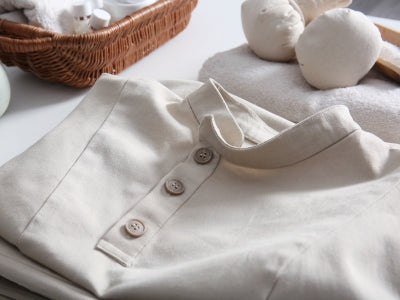When it comes to branded work uniforms, choosing the right material is essential. The material you select can significantly impact the comfort, durability, and overall appearance of your employees' uniforms. With numerous fabric options available, it can be overwhelming to determine which one is best suited for various working conditions.
In this blog post, we will explore different fabric options and provide insights into which types are ideal for different workplace settings.

Understanding Different Fabric Options
There are many different fabric types available for work uniforms. While some may appear similar, each material has its own unique properties and characteristics that should be considered when choosing the right material for your employees. The following is a brief overview of some common fabric options:
Cotton
Cotton is a popular fabric choice for work uniforms in Australia, known for its breathability and softness. It offers comfort and allows for easy movement. However, pure cotton uniforms may not be suitable for environments that require flame or chemical resistance.
- Pros: Breathable, soft, and comfortable. Allows for easy movement.
- Cons: Not suitable for flame or chemical resistance, may wrinkle easily. Cotton is also prone to fading in the wash, which may not be ideal for workers who require high-quality workwear that maintains its integrity over time.
Polyester
Polyester is a versatile fabric with excellent durability and wrinkle resistance. It is easy to clean, maintain, and withstand frequent washing. This fabric is ideal for industries where workers do physical labor or outdoor work.
This type of fabric also provides good moisture-wicking properties. However, it can trap heat, making it less suitable for extremely hot environments.
- Pros: Versatile, durable, and wrinkle-resistant. Easy to clean and maintain. Provides good moisture-wicking properties.
- Cons: Can trap heat, less suitable for extremely hot environments.
Nylon
Nylon is a lightweight and durable fabric that’s resistant to abrasion and stretching. It is commonly used in industries that involve heavy physical activities or jobs that have a risk of tearing uniforms.
Moreover, while nylon has low moisture absorption, it is not ideal for hot and humid conditions.
- Pros: Lightweight and durable. Resistant to abrasion and stretching.
- Cons: Low moisture absorption, not ideal for hot and humid conditions.
Rayon
Rayon is a synthetic fabric that closely resembles the luxurious feel of silk. It offers good breathability and drapes well, making it suitable for office settings or hospitality industries.
However, rayon is prone to wrinkles and requires special care during laundering.
- Pros: Resembles silk in feel. Offers good breathability and drapes well.
- Cons: Prone to wrinkles and requires special care during cleaning.
Fabric Blends
Fabric blends, such as polyester-cotton or polyester-spandex, combine the best features of different materials.
These blends offer improved durability, comfort, and stretch. They are often favored in industries where mobility and durability are essential, such as healthcare or fitness.
- Pros: Combines the best features of different materials. Improved durability, comfort, and stretch.
- Cons: There may be some limitations based on the specific fabric blend.

FAQs
1. What fabric is best for hot working conditions in Australia?
In hot working conditions, it is important to opt for fabrics with good moisture-wicking properties, like polyester or breathable cotton blends. These fabrics allow for proper airflow, keeping employees cool and comfortable in Australia's hot summers.
2. What fabric should I choose for dirt-prone work environments?
For dirt-prone work environments, it is advisable to select fabrics with high stain resistance, such as polyester or polyester blends. These fabrics are easy to wash and maintain. They are also less likely to show stains.
3. How can I ensure durability in rugged working conditions?
For rugged working conditions, nylon or polyester blends are excellent fabric choices. These materials offer high durability and resistance to tearing, ensuring the uniforms withstand challenging environments.
3. What fabrics are suitable for healthcare environments?
Healthcare environments often require fabrics that are easy to clean and provide comfort and flexibility. Polyester blends or moisture-wicking fabrics can be good options as they offer durability and easy maintenance.
4. What fabric should I choose for physically demanding industries?
In physically demanding industries, it is crucial to choose fabrics that offer durability and resistance to tearing. Nylon or polyester blends are excellent choices as they are lightweight and abrasion-resistant.
5. Can I have a professional appearance without compromising comfort?
Absolutely! Fabrics like rayon or polyester blends can look professional without compromising comfort. These fabrics offer a polished look while allowing for breathability and ease of movement.
6. Are there any fabrics suitable for flame or chemical resistance?
Yes, there are fabrics specifically designed for flame or chemical resistance. Fire-resistant cotton or synthetic blends, along with specific treated materials, can offer the required protection in such work environments.
7. Can I find a fabric that combines comfort, durability, and style?
Yes, fabric blends such as polyester-cotton or polyester-spandex can offer a combination of comfort, durability, and style. These blends provide improved flexibility, durability, and a polished look.
8. Are there any eco-friendly fabric options for work uniforms?
Yes, there are eco-friendly fabric options available for work uniforms. Some examples include organic cotton, bamboo fabric, or recycled polyester. These fabrics are made using sustainable practices and have a lower environmental impact.
Conclusion
Choosing the right material for work uniforms is an important decision that can impact the overall comfort and durability of your employees' clothing, especially in Australia's varying working environments.
By considering factors such as working conditions, desired comfort levels, and industry-specific requirements, you can make an informed decision. Whether you opt for breathable cotton, durable polyester, or specific blends, it's crucial to prioritise the comfort and safety of your team.
Invest in Cubic uniforms that reflect your company's professionalism, create a positive workplace environment, and enhance productivity.




